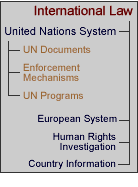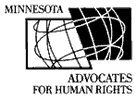|
|
|
Guidelines for Submitting Complaints to the UN Communications or complaints must follow standard rules of procedure to be admissible to a UN enforcement body. The general guidelines below apply to all complaints submitted to the UN. It is advisable, nevertheless, to also become familiar with any specific guidelines promulgated by the UN bodies to which the communication is addressed. Many of the specific communications requirements can be accessed through the UN website on Communications and Complaints Procedures. (1) Communications should be in writing and must describe the facts, the purpose of the complaint, and the right(s) that have been violated. Communications can be posted or faxed to the appropriate office. In some cases, the information may be sent by email. (2) Regardless of the reporting format, the precise address of the body to which the communication is sent should appear at the beginning of the communication. (3) Generally, only individuals or groups who claim to be victims of human rights violations or who have direct and reliable knowledge of such violations can submit complaints. Non-governmental organizations can submit complaints, but they must demonstrate direct, reliable evidence of the situation and often show proof of consent from the individual or groups to the submission of the communication. (4) If the complaint is submitted through either the Optional Protocol to the Convention on the Elimination of All Forms of Discrimination Against Women or the First Optional Protocol to the International Covenant on Civil and Political Rights, the communication must concern a State that is a party to the protocol, meaning the State has [ratified] [link to country pages] both the treaty and the protocol and has accepted jurisdiction. (5) Complaints to some UN bodies may be submitted anonymously. Other UN bodies, such as the Human Rights Committee will not accept anonymous complaints. In all cases, communications based solely on second-hand information, such as reports from the mass media, are not admissible. (6) A communication is inadmissible if it is inconsistent with principles of international human rights law, as contained in the United Nations Charter, the Universal Declaration of Human Rights and other treaties and conventions. The communication cannot be politically motivated. (7) The receiving body must have reasonable grounds to believe that a human rights violation exists to admit the complaint. In order to make this determination, the body receiving the communication will also consider any replies sent by the government agencies. The complainant will sometimes have the opportunity to submit additional communications about the government response. (8) A communication will only be considered after domestic remedies have been exhausted. The victim of a human rights violation or the NGO must first address the national legal system to remedy the violation. There is an exception to the rule when it can be convincingly demonstrated that either the procedures available at the national level would be ineffective or that they would extend over an unreasonable length of time. (9) A communication will not be admitted if it is under investigation or settlement by another UN body. |
| Home | Contact | Feedback | Disclaimer |

